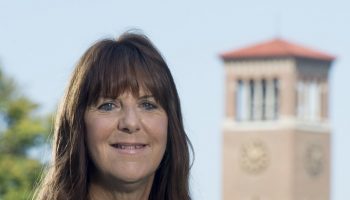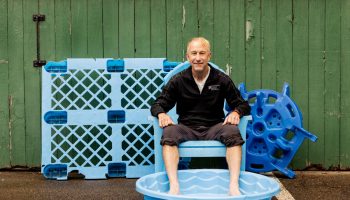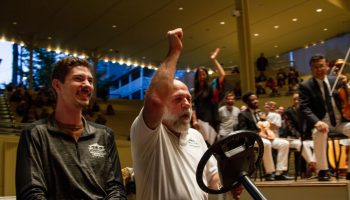Neither of the two United Church of Christ’s denominational houses is actually green, but they’re both green certified.
The UCC’s Reformed Church House at 10 Pratt, and The Mayflower, at 30 South Terrace, recently received the Green Concierge Certification in recognition of their commitment to sustainable business practices.
Although Chautauqua Institution dabbles in sustainable architecture, such as the solar panels atop Fletcher Music Hall and Turner Community Center, no lodging facilities on the grounds hold similar certification.
The certification process is structured as a tier system, with the UCC houses earning the bronze level. As Hospitality Green, the New York-based organization that grants the certification, monitors the house’s ongoing progress, it may bump the UCC houses to silver level, and so on.
“There is nothing stopping every building here to have this,” said Evadne Giannini, principal and founder of Hospitality Green.
The certification comes amid a growing awareness of greenwashing, an epithet for businesses that masquerade as something more environmentally minded than they actually are. Businesses reap all of the feel-good publicity for saving the Earth, the thinking goes, without actually doing much to help.
“We truly believe that there’s lots of greenwashing,” Giannini said, adding how the group’s reliance on third-party certifications and lack of product endorsements preclude that sort of deception.
A common greenwashing example is bottled-water manufacturers touting eco-friendly bottles made of less plastic. Less plastic is good, but the carbon dioxide emissions from American water bottle production is equivalent to the annual emissions of 400,000 passenger vehicles, according to a report from the Responsible Purchasing Network, an international group dedicated to green purchasing practices. The sustainable alternative would be to drink tap water from a reusable water bottle, not a slightly improved disposable one.
Hotels asking visitors to reuse towels is another greenwashing example, which some consumers criticize as halfhearted and ineffective. Those policies have consequences. According to a study published in the International Journal of Contemporary Hospitality Management, poorly executed linen policies sometimes repel consumers, who are less likely to provide repeat business.
Giannini recognized those concerns, and openly admitted the UCC houses are not yet state-of-the-art; walk around either of the facilities, and it’s not hard to find an occasional incandescent light bulb. But she said her organization’s certification program favors a gradual change focused on education that goes beyond simply reusing towels or overhauling infrastructure.
She said that is a step above other recognizable programs, such as the Leadership in Energy and Environmental Design (LEED) certification, which focuses on sustainable architecture and design.
“They come in and they do systems, maybe they leave a handbook, and they walk away,” Giannini said of LEED-focused architects and engineers. “But you’re the same operator who used to use the system before it became LEED-certified, and you don’t have a fig of a newton what to do.”
A LEED building may be energy-efficient, but that doesn’t prevent an employee from cranking the air conditioning down to 60 degrees all day or custodians leaving every light on at the end of the day, she said.
Instead, Giannini said, change occurs when organizations institute education programs for new employees and rewrite purchasing agreements and capital campaigns to formalize sustainable practices. For the UCC, that involves moving guest registration online, installing energy-efficient light bulbs, upgrading appliances and faucets, and generally reducing use of water and paper products.
Giannini also advocated using psychology to effect change. In a study she conducted in collaboration with the College and University Recycling Coalition, she found that putting the recycling bin on the left and the trash can on the right will result in more recycling and less contamination.
Just updating the UCC buildings’ exit signs and swapping out incandescent light bulbs for LED and CFL alternatives provided 3,500 kilowatt-hours in seasonal savings, according to UCC metrics. Based on the average national energy price of 12 cents per kilowatt-hour, that’s $420 saved on top of the environmental benefits of longer-lasting and energy-efficient light bulbs — less waste, less electricity and less harmful emissions. Those savings prove compelling to business owners, Giannini said, which may motivate greater sustainability with profit in mind.
“People start from the economic — that’s the profit piece,” she said. “Then they move to how it’s helping the greater community, and they eventually move to the individual.”
At the UCC’s Reformed Church House located at 10 Pratt, co-hostesses Sheila Marie Long and Kathy Blezard are two of the individuals responsible for executing the new standards.
Although a cleaning crew takes care of the common areas and bathrooms, their denominational house consists of 10 guest rooms which guests clean themselves with the chemical-free cleaners that replaced commercial bleach and detergents.
Guests need only spray, wait 30 seconds for the cleaner to foam and wipe it away — no water required. Other than a hint of earthiness, the cleaning products have no color and no scent, despite being certified for commercial and hospital use, Giannini said.
Both hosts said the sustainable measures the UCC implemented are neither onerous nor new. For instance, the house already recycles newspapers, Long said, and replaced harmful dish soap years ago. Guests even helped implement a composting program at the house.
When it comes to the composting, Long said, “that’s not always done when you go on vacation, yet they get involved with that.”
That educational aspect is not lost on the hosts, who’ve experienced it firsthand. Blezard said she recently spent two months renting an Arizona townhouse in a sprawling complex that didn’t recycle. After her time at the Reformed House, that drove her “crazy,” she said.
“We have 10 rooms,” Blezard said. “There are 34 at The Mayflower. That’s a lot of people coming and going every week who are going to hear about these products and actually use them themselves. Who knows what they’ll take back to their community?”






